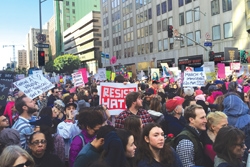Following the 2017 presidential inauguration ceremony, women assembled themselves in Pershing Square to express their dissatisfaction through protest during the Women’s March in Los Angeles.
“I’ve had very little that I consider to be a logical reason to support Trump, that I’ve been able to glean from all of this,” Eileen Pottinger, a stay-at-home-mother, wife, teacher and free-lance designer, said. “So, when I heard about the Women’s March, I was like: ‘I’m going.’”
Mother to sons Gibby, 6, and Westley, 2, Pottinger lives in Culver City with her husband, Wade.
Having attained her undergraduate degree in biology and her Master’s in architecture, Pottinger currently teaches part-time at Otis College of Art and Design and does freelance designing as her busy schedule permits.
Aside from marching in support of gay rights some years back, this is her first protest.
“I went into it thinking: ‘I don’t know exactly what I’m marching for except to say that I want to stand up for the things that I fear are going to get at least marginalized, if not completely eliminated, in our country because this guy has become president,’” she said.
Pottinger finds that the racism which has been highlighted in certain areas, is an arena in which Trump could stand to ameliorate tensions: “I think he needs to very publically, clearly and loudly condemn the racist behavior that a lot of his supporters have engaged in. But I feel crazy saying that, like it’s a pipe dream.”
As she is half-Syrian, she also feels more strongly about immigration policy following the great lengths at which she says the president has “effectively used the immigration issue to create an us-versus-them mentality.”
Ultimately, the “biggest fear [she has] is that science, facts and good reporting have all been marginalized in the pursuit of him winning,” she said.
Her main concern is the future of our Earth’s environment as she hopes Trump does not really believe climate change is something made up by the Chinese.
Having always considered herself a feminist, she defines feminism simply as women and men being treated equally.
“I feel like the problem with the Women’s March is that I don’t feel like it was focused enough,” she said. “I keep thinking of the Suffragettes. They came together because they had one specific goal. I feel like the women of this country need one specific goal to rally around, except I don’t know what that would be.”
Focusing on the wage gap that exists between genders or executing something more shocking like a naked march to highlight the long-standing problems of hyper-sexualizing women through rape culture, are only a few of the issues Pottinger believes could become the cynosure of American women.
Ultimately, women need free agency over themselves.
Abortion is an avenue which she feels ought to be avoided at all costs but that by: “making sex education better, making contraception more available, and keeping abortion legal” perhaps less women will have to employ such a resource.
In an archetypal league of her own, Pottinger’s status as a stay-at-home mother who also maintains her career, has shed light on how she feels women can hold each other to too unfair and patriarchal a standard.
“There’s this dichotomy,” she said. “You’re either working or you stay at home. I feel like I’m in this gray area.”
Limiting existence to a binary option hoists an unnecessary glass ceiling over women’s heads that too often stifles potential, social, economic, artistic and perceptive growth.
Too often, she says, women undercut each other when they should instead ally themselves against archaic tenets of patriarchy.
“I think it is vital for women to stand up for what they want regardless of what they are told to want,” she said. “Along with stepping in to male-dominated fields and roles, and not shrinking back from certain activities, I think that women need to be ready to take care of themselves.”

